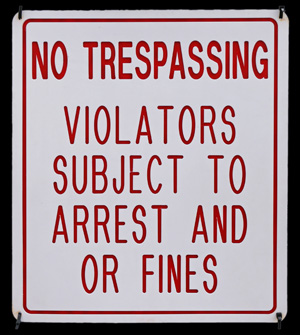 Living (and loving) Life
Living (and loving) Life
Trespassing is the act of going inside a property without the knowledge of the owner. It is the act of surreptitiously gaining entry into a property or any structure, commercial or other facilities, such as a research center, a school, or a power plant, without permission or authorization.
Those who trespass can be prosecuted in a civil or criminal court, depending on the characteristics of the trespassing incident.
Criminal Trespassing
Criminal trespassing occurs when a person knowingly goes in or remains on a property that is not his, and this can be classified as a misdemeanor. However, other factors can elevate a misdemeanor trespassing charge into a criminal trespassing case.
If, for instance, the trespasser causes damage to property or he hurts the residents, occupants or tenants of the property where he trespassed, like in cases involving burglaries or home invasions, then a trespasser can be charged for criminal trespassing.
Other factors that can enhance a trespassing charge to criminal trespassing include:
- The person trespasses even though there are visible signs or boundaries that prohibit entry to property.
- The person trespasses even though he is given a verbal warning that trespassing is not allowed.
- The person who trespasses refuses to leave although he has been informed or notified.
There are certain arguments that offenders can use to defend themselves in court. One is to prove that they did not see warning signs. Another defense will be that the offenders’ presence did not impede the day to day activities of the property owner or that the offenders immediately left the premises after being informed.
However, there are also reasons or defenses that are not accepted in court. For one, the offender cannot reason that it was alright to trespass an area known to be owned or managed by a government or public agency. Those who trespass in properties wherein their authorization was obtained using illegal or deceptive means cannot claim that they are authorized and they can be sued for criminal trespassing.
Civil Trespassing
In civil cases, a property owner must take legal action or sue a trespasser. He can do so if a trespasser encroaches in his property, stays in a private property without consent or even after consent or authorization has expired. A trespasser can also be taken to court if he moves, takes, places or uses items inside the property wherein the property owner was not aware or did not give authorization.
Penalties for civil trespass will depend on the result of court proceedings. Once a person is sued and is found guilty of civil trespass, he will be required to pay fines. Furthermore, he could also be prohibited from getting near or entering the property concerned.
The penalties and punishments for trespassing can vary from state to state. A misdemeanor case could be a felony in another state, and penalties also differ. To avoid accidentally trespassing on a property, it is best to:
- Always pay attention to warning signs or posters.
- Do not cross or go into properties that are obviously barricaded or fenced.
- Have identification cards or authentic authorization forms or letters from the owners or managers of a private property.
About the author: Claire Duvall is a freelance writer who often blogs about criminal and personal injury cases. She writes for many reputable online law websites, including ElliotSavitzLaw.com, which provides legal help and assistance to those involved in criminal offenses.
Photo credit: Marius Muresan